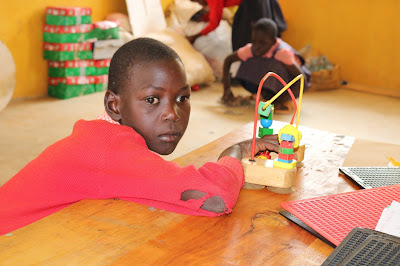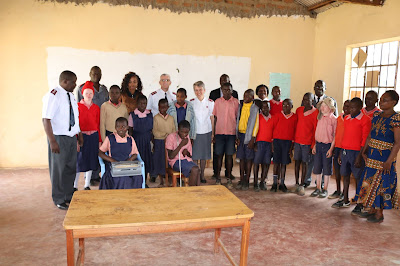Of all our
five senses, sight may be choice number one in ‘not ever wanting to lose it’. A
recent visit to The Salvation Army (TSA) Mitoto Secondary and Primary Schools
where some of the students are completely blind or visually impaired caused me to think more deeply about the affects of blindness. A
donation from TSA London Citadel Women’s Ministry group enabled us to purchase
two new braille machines for the Secondary School. The students were so excited to
receive the new equipment. Big smiles all around! Our Social / Sponsorship Secretary, Major Beatrice Musieni, had presented the need and was thrilled when a sponsor was found.
We were pleased to spend time in both schools. The visually impaired primary students have their own classes whereas the Secondary School incorporates all students together, though the administration is hoping for an alternative unit for
the visually impaired high schoolers. “We want to have additional one on one supervision and designated teaching
strategies just for them”, was the teacher's perspective.
Our tour of
the compound began by dropping in on the younger students. In a relatively bare
classroom,10-12 first graders sat together on the floor having fun with
building blocks. Sitting beside them, one child kept reaching out to hold our
hand. Some children were completely
blind, others had a percentage of sight, some could not speak, and others had additional
physical disabilities. “This little one
arrived three days ago”, the teacher whispered to us, gently touching a
sweet little girl on the back. “She was
rescued and brought here.” We didn’t learn the details but I knew wherever
this child had come from, being brought to this school was likely something
better for her. I had rarely thought of a school as a place of refuge. How
thankful I am The Salvation Army offers such a safe haven. The playful interaction among these precious
little ones was evidence they were being well cared for.
Both the
Primary and Secondary Schools are boarding schools. In the boy’s dormitory, we met the ‘house
father’ caring for both the older and younger boys who bunk together. Every bed
was covered with a mosquito net and each student has a footlocker for their belongings. It didn’t seem ideal for boys of such varied
ages to stay in the same room. We were told the school is searching for assistance
to construct separate rooms to accommodate the different age groups.
Rounding the
corner outside the dormitory, we met 20 high school students – again, some
totally blind and others visually impaired.
The group was taken out of class to greet us and receive the gifts we
brought. As we approached, they were huddled together
practicing items to present. Once we were warmly welcomed, they sang a
beautiful song with amazing harmony. Joshua, the oldest in the class, had an incredible base
voice and Joy, a bubbly and confident girl, was an obvious high soprano. They quickly introduced themselves as
‘singers’ and told us about an upcoming competition. They were thrilled to have
us listen to their song and grinned shyly as we applauded! One girl recited a poem followed by another musical item with more singing plus dancing, accompanied by Joshua on
the flute and another boy using an upside down water container for
drumming.
These
students expressed themselves eloquently with their musical talents and
speaking in clear English. Joshua, an obvious leader in the group, volunteered to say thank you on behalf of his
peers when the braille machines were offered. “I thank God for these gifts” he said. “Now we can learn more and pass our exams. Please tell the sponsors how
much this donation means to all of us here.”
Driving home,
my heart was full of gratitude to have met these students, their teachers, and
The Salvation Army Chaplains who provide Bible lessons each week. The pupils
inspired us with their resilience to overcome limitations and disabilities,
their courage and confidence in front of strangers, and their joyful spirits.
They genuinely appreciated our time together and the gifts given from strangers
in another part of the world. It was a meaningful example of being partners in
mission.
At the end of the day, I couldn't help but ponder - is it possible that
those who are blind, or visually impaired, can still actually see? I don’t mean
physically (though some may view shadows or fuzzy images). But can those who
are not as sighted as I am and you are, still ‘see’ in different ways? In Dr. Barbara Brown Taylor’s book, Learning to walk in the Dark, she
suggests when the sense of sight is missing, other senses are more pronounced. Hearing and touch and smell can actually
become like ‘eyes’. Her studies about
darkness revealed how the sound of different kinds of trees swaying in the wind
can enable a person to distinguish which type of tree it is without seeing it. And what about touch? Taylor tells of a blind person who proposes “to feel a table is a much more intimate
activity than seeing it. Run your hands across the top and you can find the
slight dip in the middle of the center panel that you might otherwise have
missed, proof that this table was planed by hand.”
In the Bible,
we read that God often appeared in dark places. He spoke to Abraham in the dark
of night. The evening sky was key to Abraham’s trust in God. Jacob wrestled with God after the sun went
down. The Israelite’s exodus from Egypt
happened during the cover of darkness and manna was supplied during the night
time. Jonah spent three days in the dark belly of a whale, while Paul spent
three days blind in Damascus. On Mount
Sinai, God’s glory came to Moses in a cloud of darkness. Is it possible that darkness, perhaps even blindness,
can be a source of spiritual revelation?
To see may mean more than just physical sight. In John 9:39, Jesus makes a statement that may
seem strange ‘til we probe it a little. “I came into this world for judgment so that
those who do not see may see, and those who do see may become blind.”
(Might need a full exegesis of the text to tackle the depth of that comment).
I make no assumptions
about the experience of a person who is blind or visually impaired. I do remember a very jovial man in one of our
corps appointments who was almost fully blind yet he loved to play Santa Claus
for the kids every Christmas! As for the
students of Mitoto, they sure energized us with the buoyancy of their spirits. They
helped us remember that physical sight is a precious gift and so is tenacious
determination when darkness falls. I may
never forget one of the students greeting us warmly: “Welcome to our school. It’s nice to see you today.”
Presenting the new braille machines
Two of the teachers
Grade 7 class using machines
Grade 7's introducing themselves to us
Primary class
The sense of touch is also a great way to learn.
Grades 5 & 6
High School students
Gospel dance with flute and drums
Joshua says "thank you so much!"
Wish you could hear them sing!
Group photo with our Social Sponsorship Secretary and School Chaplain












No comments:
Post a Comment